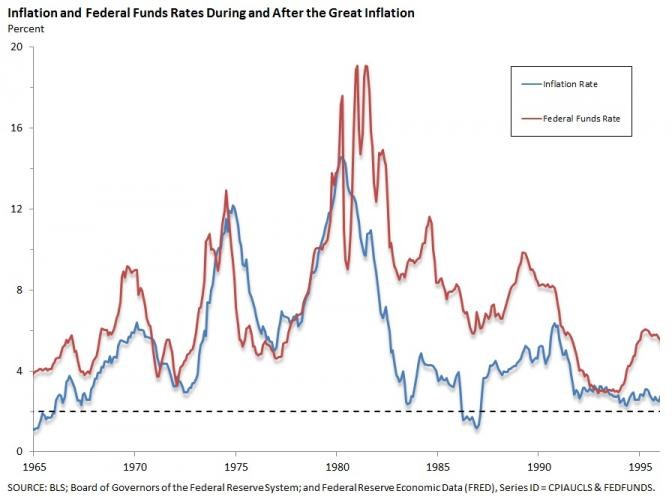The Volcker recession Who beat inflation
Post on: 16 Март, 2015 No Comment

Who beat inflation?
Add this article to your reading list by clicking this button
I MENTIONED yesterday that I had the chance to hear Paul Volcker speak on financial reform. Mr Volcker has had a distinguished career in public service, but he is perhaps best known for his time as Fed chairman, during which he famously quashed inflation, in the process sending America into what was previously the worst recession of the postwar period. The Fed began raising interest rates in 1977, and the American economy tipped into recession in 1980, at which point the central bank took its foot off the brakes. But inflation rates continued to rise, and so shortly after the economy recovered (briefly) in July of 1980, Mr Volcker orchestrated a series of interest rate increases that took the federal funds target from around 10% to near 20%.
What followed was an extraordinarily painful recession. Unemployment rose to near 11%. Manufacturing states were battered by the downturn; the near 17% unemployment rate in Michigan was worse than the state sustained in this latest recession. Mortgage lenders were devastated by high interest rates. The banking system was pushed to the point of insolvency. Things were quite bad. And while growth snapped back to trend rather quickly after the Fed took its foot offf the brake for good, there was considerable suffering through the recession, and the effects of unemployment, on health and earnings of sacked workers, persisted for years.
And yet, Mr Volcker is widely hailed as a hero for his total victory over inflation. This is understandable; inflation can be an extremely unpleasant phenomenon. It distorts consumption and investment decisions, and erodes faith in markets and government. But I found myself wondering yesterday whether the Volcker Recession was, after all, worth the pain. Was it a good decision to send the American economy into a debilitating recession for three years in order to whip inflation?
As with any counterfactual, an answer is difficult to come by. I think that if you can conclude that inflation was in an irreversible upward spiral, it seems clear that the recession was worth it. Had Mr Volcker not done what he did, some other action would have been necessary later on, and at greater cost. But was inflation really out of control?
One point worth noting is that inflation in the 1970s was largely driven by increases in energy costs, and especially by increases in the price of oil. The first oil shock, in 1973, sent consumer price inflation from around 4% to near 9%, but headline inflation thereafter fell back to 5%. Crisis hit again in 1979, and from 1978 to 1980 annual consumer price increases rose from just over 6% to near 15%.
Oil prices fell, along with inflation, during the deep American recession, but it was felt that with economic recovery, both resource prices and inflation would return. In September of 1982, two young members of Martin Feldstein’s Council of Economic Advisors, Paul Krugman and Larry Summers, wrote :
Consumer price increases in the last year and a half have been below the underlying rate because of real appreciation and declining real commodity prices. Even if these relative prices level off, the inflation rate will rise, because of the removal of the bonus.
But that’s not what happened. The energy crises of the 1970s sparked a broad interest in energy efficiency and a wave of petroleum exploration. From 1970 to 1980, global crude oil production rose by nearly 30%. Total consumption of petroleum in America didn’t return to 1978 levels until 1998. And real crude prices fell from their 1980 high to sustained low levels that persisted until about 2004. Based on fundamentals, the inflationary impact of oil crises would likely have diminished significantly into the 1980s, with or without a Volcker Recession.
Another factor supporting spiraling inflation increases was the wage-price feedback loop. As prices rose, labour organisations demanded ever high wage increases, which fed back to consumer prices, which spurred additional wage increases. This was a key factor contributing to broader consumer price inflation in America in the 1970s. But would this loop have been sustained, in the absence of recession?

Perhaps not. The share of union members in the American workforce had been in slow decline from the immediate postwar period through the early 1970s, but during the 1970s the erosion of labour power picked up speed. Between the early 1970s and the early 1980s, the share of the workforce in unions fell from around 30% to 20%. In the private sector, unionised industries were subject to increasing competition from rapidly developing, export-oriented Asian economies, notably Japan. It seems likely that eroding worker bargaining power would have made it ever more difficult for labour to demand significant wage increases on a regular basis. Declining unions would have helped to stop inflation.
Would those factors have been sufficient to take the air out of growing inflationary pressures? Perhaps not. Consumer expectations, once set, are difficult to adjust. A central bank-induced recession of some kind was probably both inevitable and beneficial. But I don’t know that the case is so clear cut as it is made out to be. Serious recessions are no small thing, and it would be good to revisit these questions every once in a while to make sure we know what we think we know.
Previous
Efficient markets: There is no right answer
Next
Recommended economics writing: Link exchange














